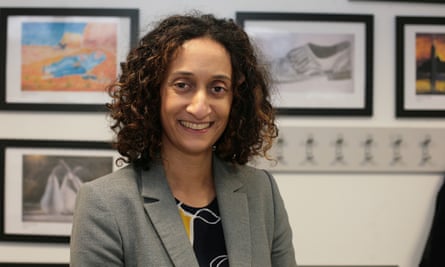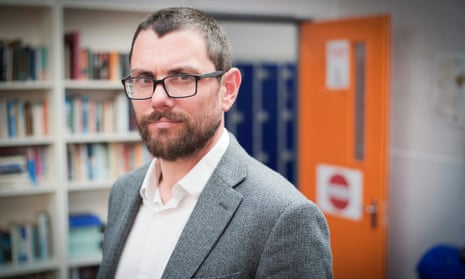Two teenagers are curled up on a sofa, asleep in each other’s arms. On the kitchen floor close by, an adult lies in a pool of blood. Soon the police will be on their way and the siblings, who were abused and neglected as children, will pay a heavy price for what they have done.
This is is a dramatic scene from Fit, the debut novel by Sammy Wright, a deputy headteacher and until this month a member of the Social Mobility Commission. His book, which evolved from his experience as a teacher, is so haunting that I found myself thinking – and even dreaming – about it days after I’d finished reading it. It has already won the Northern Book prize.
Wright, who works at Southmoor academy in Sunderland, says experience in schools has shown him that it’s extremely difficult for young people to bounce back from adverse childhood experiences. “Ask any teacher and they will tell you the character of Jack in my book – a kid who’s been abused and now acts abusively towards other kids – is not an unusual figure. Nor is Rose – a girl who’s been neglected and is sexually exploited as a teenager.”
The root cause of many children’s problems is poverty, he says. “If you want to get rid of child poverty, there’s a dead easy way and it’s called money. Give people money and they’re no longer poor. It’s not rocket science, actually: adequate welfare nets, good family hubs and good jobs in the area. That kind of stuff really helps.”
The Social Mobility Commission, an advisory body of the Department for Education, was set up in 2012 under the coalition government. It has a chequered history. In 2017, all four members of the board, including the former health secretary Alan Milburn, resigned in protest at the lack of progress made by Theresa May’s government. Wright joined in 2018 and became lead commissioner for schools and higher education in 2019. His three-year stint ends just as Katharine Birbalsingh, controversial head of the super-strict Michaela school in Wembley, is announced as the new chief commissioner.
During Wright’s three years, the commission did its best, he says, but was thwarted by the government. “Every political decision seems to be made with short-term goals in sight. And it is bullshit.”
Of the “levelling up” agenda, he says: “I think it’s a priority of the government to sound like they’re focused on this. If they want to do more than that, they need to direct funding and investment to areas of need, not just areas of political sensitivity.”
Birbalsingh is, he says, well qualified for the job – and may even have a chance to get through to ministers. “I have a great deal of admiration for what she’s achieved, and hope her personal credibility will mean she’ll be able to give important messages in ways the government might listen.”
His advice to her? “To remember that the basic equation in social mobility is very simple, and backed by a ton of evidence: equal societies are mobile societies. And the headwinds are strong – she will need to push hard to get concrete funding or policy decisions.”

He feels he and his commission colleagues did their best. “We’re proud of what we achieved – some brilliant research, a clear framework for how to measure social mobility and a real shift in the narrative around place-based inequality and what employers can do.
“But if you measure our success by recommendations actually enacted by government, then it’s pretty bleak. I don’t think it can be anything else when the universal credit cut has just gone through, and the two-child cap on benefits remains.”
Wright applied for the role on a whim. “It was all a bit accidental. I’d been doing outreach stuff with Oxford and Durham universities, running a centre in our school that was all about social mobility.” Once appointed, he was able to carry on at school, where he teaches English as well as being deputy head. During lockdown, a lot of the work went online, so he managed to fit in everything by working early and late. He gets into school at 7.15am and leaves each day at 5.30pm. Working remotely for the commission allowed him to take on more work: “I could basically say yes to anything.”
During the pandemic, as well as working on education recovery measures, he led the commission’s investigation, Against the Odds, into what can be learned from schools that are closing the progress gap and achieving better outcomes for disadvantaged pupils.
The key policy he has fought for is better funding for pupils aged 16 to 19 in education: he thinks the pupil premium should be extended for disadvantaged students in this age group. “That’s what I’ve been discussing with ministers and other organisations all year,” he says. When I ask how the discussions went, he sighs: “Education ministers seemed receptive to the idea, but it’s all about the spending review: whether the money’s there.” The spending review is expected on 27 October. “If there is one thing, it should be 16-19 education funding,” he says.
Wright is already working on his second novel, partly set in the same fictional northern town. “I’ve been teaching for 20 years and I’ve been writing all that time.” He writes intensively during the holidays, at evenings and weekends. “I’m just compulsive about it. If I don’t do it, I get unhappy.” This is his first published novel, but he had completed six full-length manuscripts: “It’s been a long learning curve.”
His mother, a social worker and counsellor, set up a centre for survivors of incest in Edinburgh, and his father was a lecturer at Edinburgh university. As a child, he attended Sciennes primary, a state school, then got a scholarship to the Edinburgh academy, a private secondary school. “I’ve always had cultural capital and I think that’s what’s given me a sense of mission. I feel there’s quite a heavy debt I need to pay, in terms of social mobility.”
He went on to study English at Oxford, and always wanted to be a teacher. He recalls one tutor telling him: “It will grind you down, my dear. Don’t do it.” He laughs at the recollection.
He spent 12 years teaching in London, at William Ellis school and then Fortismere, before moving to the north-east to set up the sixth form at Southmoor, where more than a quarter of pupils are eligible for free school meals and he feels he has more to offer the children.
The move north gave him what he calls his “political edge”. “Even compared to the disadvantaged students I taught in London, the students I teach in Sunderland are much more fragile in their sense of self, in their aspirations. While they are just as bright, just as interesting and just as capable, their frame of reference is much narrower. Many of them literally don’t know people who do fancy careers – they don’t encounter jobs much beyond care services and manual trades.”
Wright has taught children who were “really seriously neglected, to the point where they would steal food in the school”. He decided to write a novel that would reflect the reality of life for many teenagers suffering abuse, neglect or personal tragedy. “I wanted to recognise those kids – the ones who aren’t the stars that shine, but have a lot going on in the background.”
He finds the government’s approach to education frustrating. “What we need to do is sit down and think: what do kids need at the age of five, eight, 10, 15, 20? Let’s put it in place, have it planned and sequential and ensure it makes sense. Yet what we’ve got is this patchwork of nonsense that’s been accrued since the 1960s, just mishmashed together with various reforms that have been either half-arsed or overenthusiastic. Why can’t we have something better? Why can’t we take the control of education away from being such a political football?”
He is highly critical of those in power who say they want an equal society but fail to act on it. “What we do at the moment is say we want equal opportunity for all, but we don’t put our money where our mouth is. We don’t care enough. We need to do that. Otherwise it’s going to get worse.”
Fit by Sammy Wright is published by And Other Stories on 21 October.

Comments (…)
Sign in or create your Guardian account to join the discussion